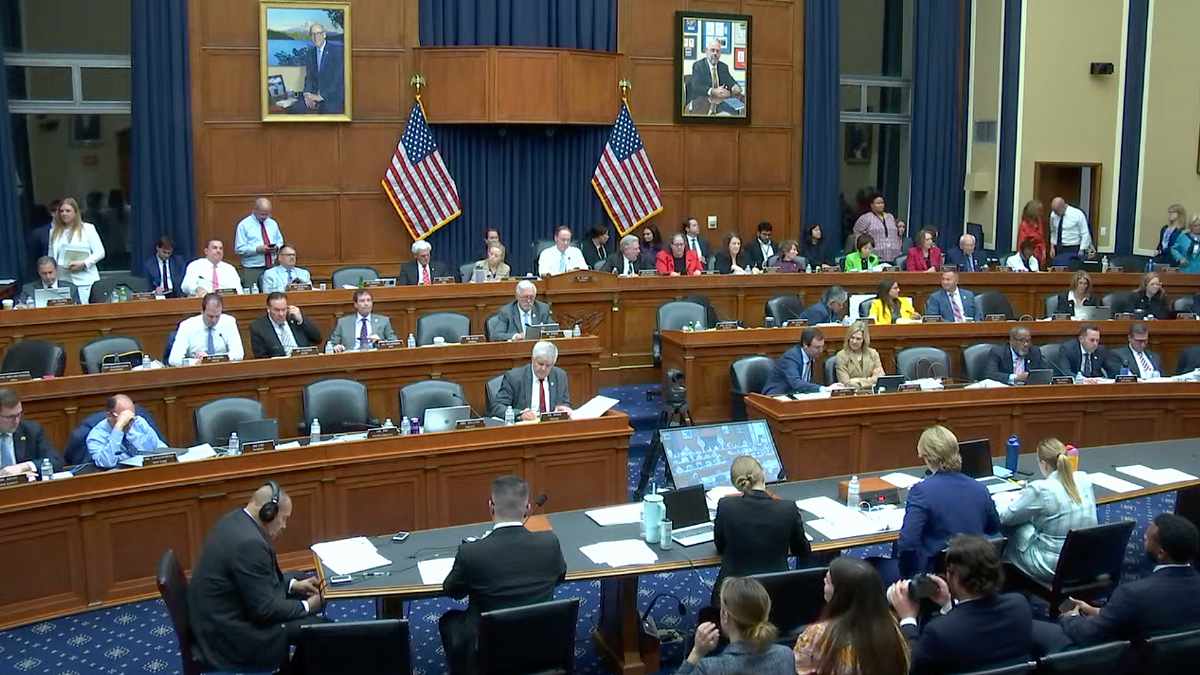AI Preemption Takes Center Stage, AI Chatbots Under Fire As New Products Endanger Kids

Welcome back to The Dispatch from The Tech Oversight Project, your weekly updates on all things tech accountability. Follow us on Twitter at @Tech_Oversight and @techoversight.bsky.social on Bluesky.

🔥 AI PREEMPTION BATTLE HEATS UP ON THE HILL: After the House shoved a 10-year moratorium on state AI laws into the reconciliation bill, it’s getting a frosty reception from key Senators on both sides of the aisle:
Senator Ed Markey said, “The Republican 10-year moratorium on state AI regulation won’t lead to an AI Golden Age. It will lead to a Dark Age for the environment, our children, and marginalized communities.”
Sen. Marsha Blackburn also came out swinging against the moratorium, pointing to its potential to stall state initiatives like Tennessee’s just-passed ELVIS Act, which protects artists’ voices from A.I. deepfakes and impersonation.
Meanwhile, Sen. Josh Hawley – equally fired up – told a reporter about the preemption provision: “I’ll try to do everything I can to kill that. It’s really terrible policy. I thought we were the party of individual rights.”
The Senate could theoretically pass the House’s reconciliation bill without Democratic votes, but only if Republicans were nearly united in support (see above: they’re not). So what comes next?
Opponents of the preemption provision (read: pretty much everyone) hope the Senate parliamentarian will rule that the moratorium doesn’t qualify for reconciliation because it’s not a budget measure. If the bill is defeated in the Senate on those grounds – which seems likely – Sen. Ted Cruz, a leading backer of the idea, might introduce it as a standalone measure.
Unfortunately, that means this fight could be far from over.

🏛️ STATES CONTINUE AI PUSHBACK: The wave of bipartisan A.I. preemption pushback isn’t limited to Capitol Hill, but is spreading in state capitals across the country as governors begin to speak out and attorneys general continue to cite the importance of existing laws like the new Kids Code in Nebraska as well as proposed state laws against deepfakes, algorithmic pricing abuses, false endorsements, commercial profiling, and more:
South Carolina AG Alan Wilson: “Instead of stepping up with real solutions, Congress wants to tie our hands and push a one-size-fits-all mandate from Washington without a clear direction. That’s not leadership, that’s federal overreach.”
Tennessee AG Jonathan Skrmetti: “The combined efforts of the states and the federal government have been, at best, barely enough to protect consumers from Big Tech…. Eliminating state oversight through this reconciliation amendment guarantees Americans will suffer repeated violations of their privacy, consumer protection, and antitrust laws.”
North Carolina AG Jeff Jackson: “The federal government shouldn’t stop states from working to keep people safe.”

“If a company knows that its product is being used by a kid, they have a duty to protect them — not exploit them. But big tech doesn’t want that. Your child’s attention is money. Their data is money. Their mental health? Their safety? That’s just collateral damage.”
– Bipartisan delegation of 17 Vermont state legislators in a recent op-ed calling for the Governor to sign their Kids Code bill

📱META CONNECTS ‘GROOMERS’ WITH TEEN TARGETS: Instagram recommended that adult sexual predators follow over 2 million minors’ accounts during just a three-month period in 2019, according to new evidence unveiled during the Meta antitrust trial.
"Horrifyingly, Meta was caught red-handed A) classifying adult users as "groomers" B) serving those "groomers" content from minors and follow recommendations of under age users. In a three month period in 2019, 27% of all accounts Meta recommended on Instagram were to classified "groomers," and 22% of those recommendations led to a friend request to a minor. Meta knowingly put children in harm's way.
💥META CHATBOT DRAWS GOP AGs’ IRE: 28 Republican state Attorneys General are demanding answers from Meta on why its new AI chatbot is sexting with teenagers and enabling adults to have simulated roleplay conversations with minors.
It’s a new spin on a recurring problem: in pursuit of profit, Meta releases a new product without any consideration for user safety — directly against the advice of its own employees — and our kids pay the price.
“We’ve fought against child exploitation for years, and we will not allow Big Tech to create new avenues for abuse, whether by accident or design,” said South Carolina’s GOP AG Alan Wilson.
📣 CHATBOT LAWSUIT UPDATE: Last week, a federal judge rejected the absurd claim that chatbots have free speech rights (and/or that the companies that make them are protected by the First Amendment for what they say), in the lawsuit to hold the Character.AI chatbot’s developers liable for pushing a teenager to suicide. The case will move forward to trial.
TOP’s Sacha Haworth: “Chatbots are untested products that pose serious and structural harms to kids, and these companies must be stopped from subjecting our children to a reckless experiment that has already caused irrevocable damage, including the tragic loss of [plaintiff Megan Garcia’s] 14-year-old son."
🙅♀️🙅♂️ NO GEMINI CHATBOT FOR KIDS: Google announced this month that it’s rolling out its AI companion for kids under 13, putting them at dire risk. Children have a tougher time understanding the difference between AI and real humans, and they often don’t know enough to avoid being tricked by AI hallucinations. Leaving kids to interact freely with artificial chatbots also likely poses risks to their social development and mental health – but Google is moving straight ahead without thought for the consequences.
We joined EPIC, Fairplay, and dozens of other groups in calling for Google to stop the planned rollout, and also called on the FTC to investigate Google for potentially violating the Children’s Online Privacy Protection Act (COPPA). They can’t be allowed to put our children’s health and safety at risk for profit.

BIG TECH’S BIG MONEY IS SHAPING TARIFFS, TOO: Trump says his tariffs are meant to protect American workers and consumers, but it’s becoming clear that some of them would significantly benefit Big Tech companies at the expense of the rest of us — suggesting their CEOs are getting what they paid for.
The tech billionaires made huge donations to Trump’s inauguration committee, have bent the knee at Mar-a-Lago – and now they’re getting tariff exceptions for their own products and the Trump administration is taking on regulators in other countries on their behalf, according to a letter Sen. Elizabeth Warren sent U.S. trade officials last week. (It looks like Trump himself is keeping track of what he sees as snubs from the CEOs, too, and making tariff decisions accordingly.)
Tech leaders hope Trump will use tariffs to negotiate for longstanding priorities like an international agreement that preempts American tech regulation. Such a deal would stop any U.S. regulatory progress on digital privacy or tech transparency in its tracks.
Legislators should look into whether companies that are funding Trump and stroking his ego are getting special treatment — and who will end up paying the price.

HOW AI CRUSHES COMPETITION IN THE CONTENT BUSINESS: Websites have seen a 30% drop in traffic since Google AI started answering users’ queries directly rather than referring them to external websites. Smaller websites — which rely on traffic for advertising revenue, user feedback, creating community, and more — are seeing their businesses crushed, illustrating the kind of damage Big Tech does when it inserts its enormous weight into a market.
And Google had promised to fund newsrooms in California in exchange for the state scrapping a bill that would have required tech platforms to compensate news outlets whose work they use. It was arguably a good deal for competitiveness in the news industry — but now Google is cutting its planned contribution by a third.
Some news organizations see the writing on the wall and are complying in advance with the tech giants to try to protect some of their revenue. The New York Times recently announced its own new partnership with Amazon, allowing their AI to use its editorial content. This is the first such licensing agreement for the Times, which had previously protected its intellectual property more aggressively — including by suing OpenAI and Microsoft for copyright infringement two years ago.

The Verge: Inside the Meta monopoly trial
Lauren Feiner of The Verge has been on site for the entire Meta monopoly trial, and breaks it down on the Vergecast now that testimony has wrapped. We won’t know the result for a while now, but she offers an up close view of each side’s strategy and the shocking revelations that came up. Listen here.

